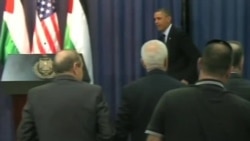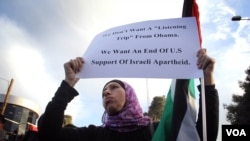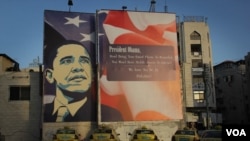Israel captured the West Bank from Jordan during the 1967 Middle East war and moving toward half a century later the Palestinians who live there are waiting for the independent nation they've been promised for decades. Many blame the United States over its long-standing support for Israel and others believe Washington has not done enough to help them even though it has mediated successive rounds of peace talks.
That's why about 150 Palestinian activists marched through the streets of Ramallah this week to protest the Obama visit. Some carried placards with and pictures of Obama in an Israeli military uniform under the words “No Hope.”
Watch related report by Jeff Custer:
Meetings with Palestinian Authority
The president visited Ramallah for talks with Mahmoud Abbas, president of the Palestinian Authority, the governing body that administers the West Bank and its more than two million Palestinian residents. Abbas and Palestinian Authority officials are expected to once again press their case for statehood and express their unhappiness over Washington's moves to block their full recognition by the United Nations.
“We’d like to see President Obama say is that in time to end the [Israeli] occupation,” says Sabri Saidam, an advisor to Abbas. “We are watching the continuation of Israeli settlement and the evaporation of the Palestinian geography.
“If we are talking about democracy and freedom, why do they [the United States] support the Tunisia, for example, but this doesn’t apply to Palestinians?” Saidam asked.
Saidam says these issues would be on Palestinian agenda this week and that Washington should now support Palestinians in their pursuit of full membership in the United Nations as a sovereign, independent nation.
Oslo Accords of 1993
The United States has played a key role in negotiations between Israelis and Palestinians over the years, and in helping to bank-roll both Israel and the Palestinian Authority—the governing body that grew out of the 1993 Oslo peace Accords.
The Hamas organization that governs the Gaza Strip and its 1.8 million Palestinian residents has been left out of the visit. It is considered a terrorist movement by the United States.
This week's protest in Ramallah was organized by Palestinians for Dignity, a coalition of a half-dozen local activist groups that has become key in organizing demonstrations against Israel, the Palestinian Authority and now the U.S. As well.
“Why are we protesting Obama’s visit?” says one member who asked not to use his name fearing arrest by Palestinian security forces. “The answer is two-fold. Both what he represents and what he’s here to do.”
He says Palestinians for Dignity are protesting the American government’s unconditional support of Israel, but also U.S. Support for the Palestinian Authority, an institution that he says lacks legitimacy in the eyes of many Palestinians.
Frustrations spill over
The Palestinian leadership has postponed elections and the 2013 Human Rights Watch report cites dozens of complaints of arbitrary detention and torture by Palestinian Authority security forces.
It is because of this, says Palestinians for Dignity, it has given-up on preaching their cause to foreign powers and instead are looking inward to Palestinian society.
“We don’t have a lot of belief that the U.S. could positively contribute here,” says the activist. “Maybe Obama is here to restart the negotiations. That might seem like a rosy objective but Palestinians have seen what that has brought us.”
Even those here who know the United States well say Washington has an image problem with Palestinians when it comes to possibly restarting the moribund Israeli-Palestinian peace process.
“'Process' has become a four letter word in the Palestinian lexicon,” says Sam Bahour, a Palestinian-American. He moved to the West Bank from Ohio, where he was born just after the signing of 1993 Oslo Accords.
“After 20 years of Oslo and negotiations, Palestinians are convinced the U.S. cannot play a neutral role,” says Bahour. “They support Israel, politically, financially and militarily. Palestinians have almost zero hope. Every time a dignitary, American or not, visits, they raise expectations but will not hold Israel accountable.”
Many Palestinians were hopeful when Obama took office, but the U.S. opposition to their bid for full membership in the United Nations last year was a serious blow to their belief in America’s interest in achieving a Palestinian state.
On the main road that runs from Jerusalem to Ramallah, large posters bearing President Obama’s picture line the street, but the posters aren’t there to welcome the U.S. president to the Palestinian Territories, but rather, to chide him:
“President Obama, Don’t bring your Smart Phone to Ramallah. You Won’t Have Mobile Access to Internet. We have no 3G in Palestine!”
The signs are designed to focus attention on a small but indicative fact of life in the West Bank. Israel restricts access to the frequencies Palestinian mobile carriers need to offer fast 3G service to customers.
As Palestinians try to build the state promised by the Oslo Accords, they face the continued challenges of occupation—no control over their borders and trade, continued Israeli settlement activity and even an inability to offer the kind of mobile communications needed for business. Some feel the U.S. should use the clout of its $3 billion in yearly aid to Israel to push for changes.
“America does nothing to help us,” says 35-year-old Bilal, wheeling his taxi through the streets of Ramallah, a city where many are dependent on Palestinian Authority salaries. “When Israel doesn’t transfer us our money, Obama should do something.”
When the Palestinian leadership asked for membership in the United Nations, Israel withheld tax money and U.S. Congress also delayed aid bound for the government in Ramallah. The Authority couldn’t pay full salaries and the effect was felt across the territories.
Even so, not all Palestinians have given up. In his clothing store across from one of the massive posters warning Obama about his smart phone, Nasser Shatawi is hopeful.
“Obama is better than President Bush. He wants to make peace,” says Shatawi. “I ask Obama, help Palestinians, help us make peace and have security. But I wonder if he knows how.”








